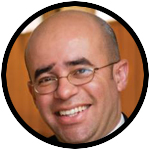
Hosffman Ospino
The wheels have been in motion for more than a year in preparation for the October 2018 synod. Bishops, observers and other voices from around the world will gather to reflect about “Young people, faith and vocational discernment.” This is definitely a most timely conversation.
The Vatican released in June a questionnaire that aims at taking the pulse of various realities shaping the lives of young Catholics. The 53 questions range all the way from basic demographic information to perspectives about life, relationships, politics and faith. A rather ambitious questionnaire, indeed!
The results of the questionnaire will be helpful to write the working document to ground the conversation among the bishops and others attending the synod. However, it seems that the primary beneficiaries of such process of data collection should be dioceses and parishes. Like politics, to paraphrase a popular expression, all ministry is local.
[hotblock]
Will the information received in the context of each diocese be available to local leaders so they can study it and act upon it? I hope it is.
Learning about young Catholics in Europe, Africa and Latin America can be very interesting. As a theologian and a researcher, I will definitely be paying close attention to this exercise. However, living in the United States, I want to know what our own Catholic young women and men are saying, what they need and how we should better accompany them on their faith journeys.
Is a questionnaire enough to learn what we need to learn about young Catholics in the United States? Well, questionnaires are valuable tools, but we should not limit our imagination. Dioceses and parishes should intentionally find every possible way to listen to their own young people, and do so humbly and attentively.
In our culturally diverse church, we have an obligation to listen attentively to young people of all backgrounds. I want to make a special case for really listening to young Hispanic Catholics.
Take all U.S. Catholics younger than 18: about 60 percent are Hispanic. The synod organization is focusing on young people ages 16 to 29. This roughly encompasses the so-called millennial population. In the U.S., nearly half of all Catholic millennials are Hispanic (about 46 percent).
Regardless of how one defines youth, any conversation about how young Catholics live their faith and discern their vocation in our country needs to seriously pay attention to young Hispanics.
One major concern is that most young Hispanic Catholics are practically invisible to many of our pastoral outreach efforts in parishes and dioceses. Only a tiny fraction of this population attends Catholic schools.
An even smaller group is present in Catholic colleges. The vast majority of young Hispanic Catholics benefit from neither youth ministry nor catechetical programs.
[hotblock2]
To really listen to young Hispanic Catholics — about half of all young U.S. Catholics — we need to do much more than rely on online questionnaires. We need to go out to the peripheries where they live. We need to reach out.
Three practical suggestions: One, ensure that all local teams and reflection efforts related to the theme of this synod have Hispanic voices and make their concerns a priority.
Two, become familiar with the work of the National Catholic Network de Pastoral Juvenil Hispana: La RED and the Fifth National Encuentro of Hispanic/Latino Ministry.
Three, should not at least half of the voices attending the synod representing the U.S. be Hispanic or people evidently familiar with the realities that shape the lives of young Hispanics? Representing our current demographics in local and global conversations would prophetically convey that we understand who we are.
***
Ospino is professor of theology and religious education at Boston College. He is a member of the leadership team for the Fifth National Encuentro of Hispanic/Latino Ministry.
PREVIOUS: In a ‘dismal time,’ what is a Catholic voter to do?
NEXT: How an unknown lobbyist became a hero for life


Share this story